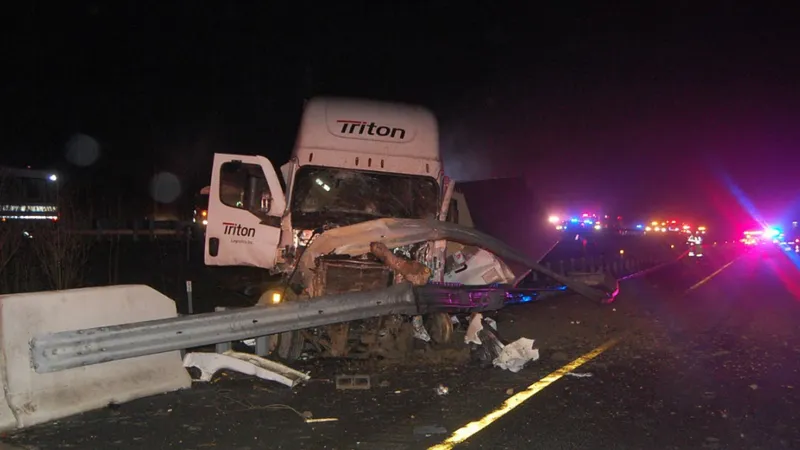A fatigued truck driver and a company culture that bypassed hours-of-service (HOS) regulations using falsified logs contributed to a deadly 2022 crash in Virginia involving a slow-moving party bus, according to a federal safety investigation.
The Triton Logistics tractor-trailer was traveling at 65.5 mph on cruise control just before the collision, with engine control module data showing the driver did not brake before impact, according to a National Transportation Safety Board (NTSB) report released last month.
The party bus, traveling in the right-most lane on I-64 near Williamsburg at around 1:36 a.m., was estimated to be moving at about 25 mph in the moments leading up to the crash and roughly 20 mph at the time of impact. The collision forced the bus across several lanes of traffic and through a center median guardrail, ejecting all 23 passengers and resulting in three fatalities, the NTSB report stated.
None of the bus passengers were wearing seatbelts in the limousine-style seating, and the Triton driver’s seatbelt was buckled behind him rather than properly worn, according to the investigation.
The driver was delivering a load from Missouri on December 14, headed to a drop yard in Chesapeake, Virginia, and was operating under the pretense of being part of a team driver setup, as revealed in an interview with NTSB senior accident investigators. This arrangement allowed the company to bypass hours-of-service (HOS) regulations, according to the agency.
Several former Triton drivers told the NTSB and the Federal Motor Carrier Safety Administration (FMCSA) about practices used to avoid complying with legal driving hours. The driver involved in the crash admitted to investigators, “I basically repeated what they told me to say.” He explained that he would tell inspectors and police that he had recently dropped off a codriver at a truck stop, which he also did the night of the fatal crash.
Triton’s CEO and HOS manager denied knowledge of the fake logins, according to the report. However, the investigation found that the codriver’s login was almost identical to the driver’s, with the only difference being the addition of two letters, “tl,” at the end. Triton’s HOS manager claimed his team created driver electronic logging device (ELD) logins but denied generating multiple logins for the same driver, calling it a possible “mistake.” Triton’s CEO was also unable to explain the discrepancy with the codriver’s login.
As part of its recommendations, the NTSB urged the FMCSA and the National Highway Traffic Safety Administration to implement previously suggested reforms, including forward collision avoidance systems and mandatory inward-facing video cameras for buses and trucks over 10,000 pounds.
The NTSB report noted that while advanced vehicle technologies such as automatic emergency braking and adaptive cruise control were available as standard features for the truck-tractor involved in the crash, the carrier chose not to purchase these systems in exchange for a discount on the 2022 Freightliner Cascadia.
Among the new recommendations were a fatigue management program for Triton and improved sharing of commercial vehicle safety information in Virginia. The NTSB emphasized that tracking data entry in electronic logging device (ELD) software could enhance accountability, increase transparency, and discourage motor carriers from falsifying entries to bypass hours-of-service regulations.
